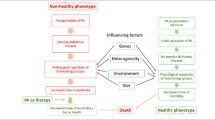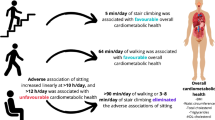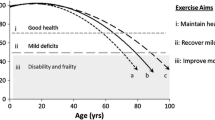Abstract
Accumulating evidence suggests that physical activity may be beneficial in preserving cognition in late life. This study examined the association between baseline and changes in physical activity and cognitive decline in community-dwelling older people. Data were from the Korean Longitudinal Study of Aging, with 2605 aged 65 years and older subjects interviewed in 2006 and followed up for 2 years. Cognitive decline was defined by calculating the Reliable Change Index using the Mini-Mental State Examination. Physical activity levels were categorized as sedentary, low, or high. Changes in physical activity were classified as inactive, decreaser, increaser, or active. Logistic regression analysis of baseline and changes in physical activity with cognitive decline was performed. Compared with the sedentary group at baseline, both the low and high activity groups were less likely to experience cognitive decline. The active (odds ratio [OR] = 0.40, 95 % confidence interval [CI] 0.23–0.68) and increaser (OR = 0.45, 95 % CI 0.27–0.74) group, compared with the inactive counterpart, demonstrated a significantly lower likelihood of cognitive decline. Older adults who remained active or increased activity over time had a reduced risk of cognitive decline. Engagement in physical activity in late life may have cognitive health benefits.

Similar content being viewed by others
References
Andresen EM, Malmgren JA, Carter WB, Patrick DL (1994) Screening for depression in well older adults: evaluation of a short form of the CES-D. Am J Prev Med 10:77–84
Bárrios H, Narciso S, Guerreiro M, Maroco J, Logsdon R, de Mendonça A (2013) Quality of life in patients with mild cognitive impairment. Aging Ment Health 17:287–292
Bielak AAM, Cherbuin N, Bunce D, Anstey KJ (2014) Preserved differentiation between physical activity and cognitive performance across young, middle, and older adulthood over 8 years. J Gerontol B Psychol Sci Soc Sci 69:523–532. doi:10.1093/geronb/gbu016
Chang M et al (2010) The effect of midlife physical activity on cognitive function among older adults: AGES—Reykjavik study. J Gerontol A Biol Sci Med Sci. doi:10.1093/gerona/glq152
Chelune GJ, Naugle RI, Luders H, Sedlak J, Awad IA (1993) Individual change after epilepsy surgery: practice effects and base-rate information. Neuropsychology 7:41–52
Colcombe S, Kramer AF (2003) Fitness effects on the cognitive function of older adults: a meta-analytic study. Psychol Sci 14:125–130. doi:10.1111/1467-9280.t01-1-01430
Folstein MF, Folstein SE, McHugh PR (1975) Mini-Mental State. A practical method for grading the cognitive state of patients for the clinician. J Psychiatr Res 12:189–198
Frerichs RJ, Tuokko HA (2005) A comparison of methods for measuring cognitive change in older adults. Arch Clin Neuropsychol 20:321–333
Gow AJ, Corley J, Starr JM, Deary IJ (2012a) Reverse causation in activity-cognitive ability associations: the Lothian Birth Cohort 1936. Psychol Aging 27:250–255
Gow AJ, Mortensen EL, Avlund K (2012b) Activity participation and cognitive aging from age 50 to 80 in the glostrup 1914 cohort. J Am Geriatr Soc 60:1831–1838. doi:10.1111/j.1532-5415.2012.04168.x
Hensel A, Luck T, Luppa M, Glaesmer H, Angermeyer MC, Riedel-Heller SG (2009) Does a reliable decline in Mini Mental State Examination total score predict dementia? Diagnostic accuracy of two reliable change indices. Dement Geriatr Cogn Disord 27:50–58
Hötting K, Röder B (2013) Beneficial effects of physical exercise on neuroplasticity and cognition. Neurosci Biobehav Rev 37:2243–2257
Kang Y, Na DL, Hahn S (1997) A validity study on the Korean Mini-Mental State Examination (K-MMSE) in dementia patients. J Korean Neurol Assoc 15:300–308
Kim D-H et al (1999) Prevalence of dementia in the elderly of an urban community in Korea. Korean J Prev Med 32:306–316
Kirk-Sanchez NJ, McGough EL (2014) Physical exercise and cognitive performance in the elderly: current perspectives. Clin Interv Aging 9:51–62
Korea Labor Institute (2010) About KLoSA: Korean longitudinal study of aging. Korea Labor Institute. http://www.kli.re.kr/klosa/en/about/introduce.jsp. Accessed February 6, 2010
Kowalski K, Rhodes R, Naylor PJ, Tuokko H, MacDonald S (2012) Direct and indirect measurement of physical activity in older adults: a systematic review of the literature. Int J Behav Nutr Phys Act 9:148
Ku P-W, Stevinson C, Chen L-J (2012) Prospective associations between leisure-time physical activity and cognitive performance among older adults across an 11-year period. J Epidemiol 22:230–237
Lavery LL, Dodge HH, Snitz B, Ganguli M (2009) Cognitive decline and mortality in a community-based cohort: the Monongahela Valley Independent Elders Survey. J Am Geriatr Soc 57:94–100. doi:10.1111/j.1532-5415.2008.02052.x
Lee Y, Kim JH, Lee KJ, Han G, Kim JL (2005) Association of cognitive status with functional limitation and disability in older adults. Aging Clin Exp Res 17:20–28
Lee Y, Back JH, Kim J, Byeon H (2010a) Multiple socioeconomic risks and cognitive impairment in older adults. Dement Geriatr Cogn Disord 29:523–529
Lee Y et al (2010b) Systematic review of health behavioral risks and cognitive health in older adults. Int Psychogeriatr 22:174–187
Liang KY, Zeger SL (1986) Longitudinal data analysis using generalized linear models. Biometrika 73:13–22
Lindwall M et al (2012) Dynamic associations of change in physical activity and change in cognitive function: coordinated analyses of four longitudinal studies. J Aging Res 2012:493598
Lytle ME, Vander Bilt J, Pandav RS, Dodge HH, Ganguli M (2004) Exercise level and cognitive decline: the MoVIES project. Alzheimer Dis Assoc Disord 18:57–64
Mackinnon A, Christensen H, Hofer SM, Korten AE, Jorm AF (2003) Use it and still lose it? The association between activity and cognitive performance established using latent growth techniques in a community sample. Aging Neuropsychol Cogn 10:215–229
Martinson BC, Crain AL, Pronk NP, O’Connor PJ, Maciosek MV (2003) Changes in physical activity and short-term changes in health care charges: a prospective cohort study of older adults. Prev Med 37:319–326
Middleton LE, Mitnitski A, Fallah N, Kirkland SA, Rockwood K (2008) Changes in cognition and mortality in relation to exercise in late life: a population based study. PLoS One 3:e3124. doi:10.1371/journal.pone.0003124
Mitnitski A, Fallah N, Rockwood MRH, Rockwood K (2011) Transitions in cognitive status in relation to frailty in older adults: a comparison of three frailty measures. J Nutr Health Aging 15:863–867. doi:10.1007/s12603-011-0066-9
National Institute on Alcohol Abuse and Alcoholism (2005) Helping patients who drink too much: a clinician’s guide. National Institutes of Health, Bethesda
Park HL, O’Connell JE, Thomson RG (2003) A systematic review of cognitive decline in the general elderly population. Int J Geriatr Psychiatry 18:1121–1134
Park MH, Kwon DY, Jung JM, Han C, Jo I, Jo SA (2013) Mini-Mental Status Examination as predictors of mortality in the elderly. Acta Psychiatr Scand 127:298–304. doi:10.1111/j.1600-0447.2012.01918.x
Plassman BL, Williams JW, Burke JR, Holsinger T, Benjamin S (2010) Systematic review: factors associated with risk for and possible prevention of cognitive decline in later life. Ann Intern Med 153:182–193
Richards M, Hardy R, Wadsworth MEJ (2003) Does active leisure protect cognition? Evidence from a national birth cohort. Soc Sci Med 56:785–792. doi:10.1016/s0277-9536(02)00075-8
Sofi F, Valecchi D, Bacci D, Abbate R, Gensini GF, Casini A, Macchi C (2011) Physical activity and risk of cognitive decline: a meta-analysis of prospective studies. J Intern Med 269:107–117. doi:10.1111/j.1365-2796.2010.02281.x
Stein J et al. (2012) Assessing cognitive changes in the elderly: reliable change indices for the Mini-Mental State Examination. Acta Psychiatr Scand:1–11. doi:10.1111/j.1600-0447.2012.01850.x
Sun F, Norman I, While A (2013) Physical activity in older people: a systematic review. BMC Public Health 13:449
van Gelder BM, Tijhuis MAR, Kalmijn S, Giampaoli S, Nissinen A, Kromhout D (2004) Physical activity in relation to cognitive decline in elderly men: the FINE study. Neurology 63:2316–2321
Voelcker-Rehage C, Niemann C (2013) Structural and functional brain changes related to different types of physical activity across the life span. Neurosci Biobehav Rev 37:2268–2295. doi:10.1016/j.neubiorev.2013.01.028
Weuve J, Kang JH, Manson JE, Breteler MMB, Ware JH, Grodstein F (2004) Physical activity, including walking, and cognitive function in older women. JAMA 292:1454–1461. doi:10.1001/jama.292.12.1454
Wilson RS, Boyle PA, Segawa E, Yu L, Begeny CT, Anagnos SE, Bennett DA (2013) The influence of cognitive decline on well-being in old age. Psychol Aging 28:304–313
Won CW et al (2002) The development of Korean Activities of Daily Living (K-ADL) and Korean Instrumental Activities of Daily Living (K-IADL) scale. J Korean Geriatr Soc 6:107–120
World Health Organization (2010) Global recommendations on physical activity for health. World Health Organization, Geneva
Xue Q-L et al (2012) Patterns of 12-year change in physical activity levels in community-dwelling older women: can modest levels of physical activity help older women live longer? Am J Epidemiol 176:534–543. doi:10.1093/aje/kws125
Yaffe K, Barnes D, Nevitt M, Lui LY, Covinsky K (2001) A prospective study of physical activity and cognitive decline in elderly women: women who walk. Arch Intern Med 161:1703–1708
Yaffe K et al (2010) The effect of maintaining cognition on risk of disability and death. J Am Geriatr Soc 58:889–894. doi:10.1111/j.1532-5415.2010.02818.x
Acknowledgments
This study was supported by the Basic Science Research Program through the National Research Foundation of Korea (NRF), funded by the Ministry of Education, Science and Technology (2012R1A1B3002939).
Conflict of interest
The authors have no conflict of interests to declare.
Author information
Authors and Affiliations
Corresponding author
About this article
Cite this article
Lee, Y., Kim, J., Han, E.S. et al. Changes in physical activity and cognitive decline in older adults living in the community. AGE 37, 20 (2015). https://doi.org/10.1007/s11357-015-9759-z
Received:
Accepted:
Published:
DOI: https://doi.org/10.1007/s11357-015-9759-z




